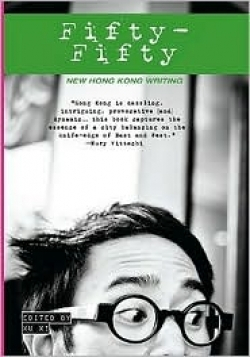
Fifty-Fifty
New Hong Kong Writing
Hong Kong—bright lights, deep harbors, yearning, regret, hope, and all the complexities that come from being one of the densest places on earth. For-ty-two writers tackle the subject of Hong Kong in the new anthology edited by Xu Xi, Fifty-Fifty: New Hong Kong Writing. These writers are natives and transplants, visitors and money-makers. They are delving into the past, escaping the present or trying to discover the attraction the place holds for their parents. They love it, hate it, fear it, and are their best and worst selves on those crowded streets. Whatever their inherent attitude toward Hong Kong, their writing draws us into the fold and introduces us to a remarkable place.
Fifty-Fifty sports a clever classification system—practically a poem in itself—with sections titled “Almost a Love Story,” “Personal Histories, And a Little Real History,” “Apocalypse Now and Then,” and “Ambivalent Philosophies,” to name a few. Poems rub elbows with personal essays, short stories slide into historical accounts; structure becomes as much a reflection of Hong Kong as the inspired content.
“From every angle, at any time of day, Hong Kong can blow you away.” Keane Shum expresses the wonderment that many of these writers feel toward their native or adopted land. Shum’s short essay, titled “Live It, Love It,” is an ode to the chaos that comes with living in a constant crowd, a situation Justin Hill remarks on in his short story, “Smog.” “…She looked at the lines of home lights and fire escapes and felt surrounded by people that she liked and who liked her. All of them—that constant stream of randomly produced passers-by of all shapes and sizes and ages—like computer generated characters flowing past her in a constant stream.” At first the population is an attraction, a sign of a new life for Hill’s protagonist, Meili, but eventually she longs for home and its spacious quiet. To be in Hong Kong is to be surrounded, a state that some thrive upon, others choke upon.
Population is not the only distraction in Hong Kong. Politics plays a part in the lives of many of these writers. Hong Kong was transferred to Chinese sovereignty from the British in 1997—an event referred to as the Handover—for a period of fifty years. While Hong Kong is considered to be a part of China, it maintains its own economy and government, though in 2047 its status may change according to China’s ever-increasing economic and political strength. Only time will tell.
Susan Blumberg-Kason follows the political tides of Hong Kong through language in her essay, “The Spoken Word.” When she first travels to Hong Kong in the early 1990s to study Mandarin she has trouble finding people who speak it. Not even twenty years later, Mandarin can be heard all over Hong Kong. “It seems that the post-Handover mainland immigrants are bringing their language outside the walls of their homes and into Hong Kong society—for good. What will the next few decades bring in terms of language to Hong Kong?” The political becomes the personal; change in sovereignty can be perceived at the most basic, daily level: the language used to communicate.
The 2003 SARS epidemic, in which 278 people died and the government was accused of being slow to warn the population of the danger of the disease, also plays a key role in many of the pieces in this anthology. In her poem, “Moths,” Agnes S.L. Lam remarks, “278 dead, / in this hospital or that. / Before Sars, people used to die too / but no one gave you statistics / every day…” Like many of the poems included here, Lam’s lines are deceptively simple, laid upon a foundation of complexity that twines together the familiar reactions to disease, protestations, or heartache with mo-ments of geographical specificity, like the moths that look like flakes of cocoa powder that settle around Lam’s house during the epidemic.
The writers in Fifty-Fifty: New Hong Kong Writing are well aware of the political time line, of the barely perceptible changes that shift their daily lives. But mostly they carry on with the acutely personal business of being alive. They fall in love, they learn languages, they have sex, they lose their way, they walk between the rain drops. The essays, stories, and poems in this collection range from the deeply personal to the widely universal, from the sympathetic to the harsh—the one trait they all hold in common is their ultimate quality.
Reviewed by
Andi Diehn
Disclosure: This article is not an endorsement, but a review. The publisher of this book provided free copies of the book to have their book reviewed by a professional reviewer. No fee was paid by the publisher for this review. Foreword Reviews only recommends books that we love. Foreword Magazine, Inc. is disclosing this in accordance with the Federal Trade Commission’s 16 CFR, Part 255.
